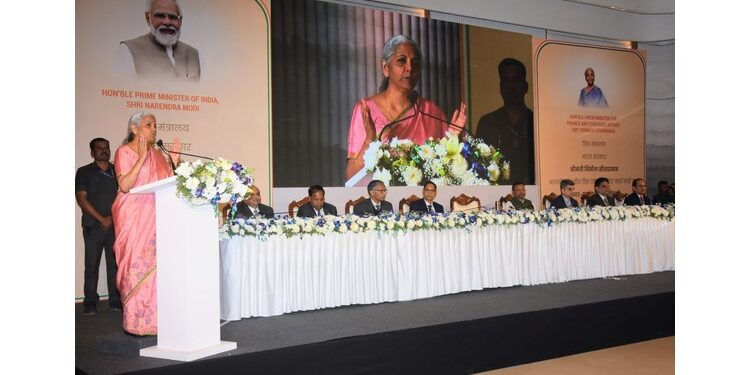Union Finance and Corporate Affairs Minister Nirmala Sitharaman launched the Mutual Credit Guarantee Scheme for Micro, Small and Medium Enterprises (MCGS – MSME) for facilitating loans upto Rs 100 crore to MSMEs for purchase of machinery or equipment without collateral, in pursuance of the Union Budget 2024-25 announcement, at the post-budget stakeholders’ interaction in Mumbai, yesterday.
The minister also virtually inaugurated the first ‘Sachal Aaykar Seva Kendra’ at Mumbai, to be operational in Navy Nagar and Colaba from 18th and 19th February, 2025, respectively, designed to facilitate access to digital services, provide assistance for grievance redressal, and to promote tax awareness.
Sitharaman also handed over ceremonial keys to the home owners benefitted by the SWAMIH Investment Fund of SBI Ventures. Pankaj Chaudhary, Union Minister of State (MoS), Finance; Tuhin Kanta Pandey, Secretary (Finance); Ajay Seth, Secretary, DEA; Dr Manoj Govil, Secretary, Department of Expenditure; M Nagaraju, Secretary, Department of Financial Services; Arunish Chawla, Secretary, Department of Investment and Public Asset Management (DIPAM); Ravi Agrawal, Chairman, Central Board of Direct Taxes (CBDT) and Sanjay Kr Agarwal, Chairman, Central Board of Indirect taxes and Customs (CBIC), were also present on the occasion.
In her keynote address, Sitharaman stated that government continues its post-COVID capital and asset-building strategy, with increased allocations for capital expenditure to drive infrastructure development.
The Finance Minister outlined the major takeaways from the Budget 2025-26, emphasising economic growth, responsible fiscal management and key structural reforms aimed at realising the vision of Viksit Bharat.
Government’s emphasis post Covid for public expenditure in asset building continues and hence, capex is 10.2 per cent more in Budget 2025-26 than the last budget (Vote-on-account 2024-25). The capex budget has been significantly increased and stands at around Rs 16 lakh crore, stated the Finance Minister.
The government remains steadfast in its commitment to fiscal consolidation, with a clear roadmap to bring the fiscal deficit below 4.5 per cent. Borrowings are focussed on capital asset creation, ensuring sustainable economic growth.
She assured, “We are on track to bring the Debt-to-GDP ratio down to 50 per cent by FY 2030-31. This reflects our disciplined approach towards financial stability without compromising on education, healthcare, or infrastructure investments.”
Send news announcements/press releases to:
info@b2bmarketmedia.com

























































